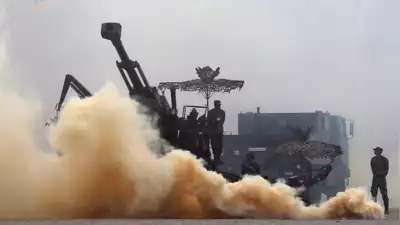
Exclusive: India sends weapons to Ukraine, which makes Russia angry
European customers have taken artillery shells made in India and sent them to Ukraine. New Delhi has not stepped in to stop the trade, even though Moscow has complained, according to eleven Indian and European government and defense industry officials and a Reuters analysis of publicly available customs data.
According to the sources and the customs data, the transfer of weapons to help Ukraine defend itself against Russia has been going on for more than a year. Indian laws on arms exports say that weapons can only be used by the person who officially bought them. If weapons are transferred without permission, the person who bought them could lose future sales.
During a meeting in July between Russian Foreign Minister Sergei Lavrov and his Indian counterpart, three Indian officials said the Kremlin brought up the topic at least twice.
Reuters is the first news organization to report specifics about the movements of weapons.
When asked about it, Russia’s and India’s foreign and military ministries did not answer. Ranghir Jaiswal, a spokesman for India’s foreign ministry, told a news conference in January that India had not sent or sold gun shells to Ukraine.
Two people in the Indian government and two people in the defense industry told Reuters that Delhi made very little of the ammo that Ukraine was using. One official said that it made up less than 1% of all the weapons that Kyiv had bought since the war. The news agency couldn’t say for sure if the European customers sold the weapons again or gave them to Kyiv.
Italy and the Czech Republic are two European countries that send Indian weapons to Ukraine. The Czech Republic is also leading a plan to get artillery shells from outside the European Union to Kyiv, according to a Spanish official, a senior Indian official, and a former top executive at Yantra India, a state-owned company that makes weapons that Ukraine uses.
The Indian source said that Delhi was keeping an eye on things. But he and a defense industry official who knew about the transfers said that India had not done anything to stop the flow of weapons to Europe. Like most of the 20 people Reuters talked to, they asked to remain anonymous because the subject was private.
When asked for comments, the defense ministries of Ukraine, Italy, Spain, and the Czech Republic did not reply.
Delhi and Washington, which is Ukraine’s main security supporter, have recently stepped up their defense and diplomatic work together. This is because both countries see China as their major rival and it is growing.
India also has good relations with Russia, which has been its main source of arms for decades. Prime Minister Narendra Modi has refused to join the sanctions against Moscow that are led by the West.
But Delhi, which has been the world’s biggest buyer of weapons for a long time, sees the long war in Europe as a chance to grow its new arms export business, according to six Indian sources who know what the government is thinking.
Ukraine is desperately short of artillery ammunition as it fights to stop a Russian advance toward Pokrovsk, a logistics hub in the east.
The White House wouldn’t say anything, and the U.S. State Department told people who asked about Delhi’s arms sales to talk to the Indian government.
The Stockholm International Peace Research Institute, a think tank, says that between 2018 and 2023, India sent just over $3 billion worth of arms abroad.
At a meeting on August 30, Defence Minister Rajnath Singh said that India’s defense exports went over $2.5 billion in the last fiscal year and that the government wanted to raise that amount to about $6 billion by 2029.
According to records that can be bought, three big Indian ammunition companies—Yantra, Munitions India, and Kalyani Strategic Systems—sent only $2.8 million worth of parts for weapons to Italy, the Czech Republic, Spain, and Slovenia in the two years before the invasion in February 2022. These countries have defense contractors who have put a lot of money into supply chains for Ukraine.
The amount went up to $135.25 million between February 2022 and July 2024, along with finished weapons that India started sending to the four countries.
An expert on Indian defense at Stanford University named Arzan Tarapore said that Delhi’s efforts to increase the number of arms it sends abroad were a big reason why its weapons end up in Ukraine.
“Probably in the sudden recent expansion, some instances of end-user violations have occurred.”
SECRET DELIVERIES
The former top Yantra official said that the Italian defense firm Meccanica per l’Elettronica e Servomeccanismi (MES), which is not on the stock market, was one of the companies sending shells made in India to Ukraine.
The biggest foreign customer for Yantra is MES. The manager said that the company in Rome buys empty shells from India and puts explosives inside them.
The executive said that some Western companies could fill explosives but didn’t have the engineering skills to make a lot of artillery shells.
In its 2022–23 annual report, Yantra said it had agreed to meet with an unnamed Italian client to build a line to make L15A1 shells. A former Yantra executive recognized this client as MES.
MES and Yantra India did not answer emails asking for comments.
Customs records show that between February 2022 and July 2024, Yantra sent $35 million worth of empty 155mm L15A1 shells to MES.
Also, customs records show that in February 2024, the U.K.-based arms company Dince Hill sent $6.7 million worth of ammunition from Italy to Ukraine. A top MES official is on the board of Dince Hill.
155mm L15A1 shells were exported. The customs declaration said that MES made them for Ukraine’s military Ministry and sent them to “promote the defense capability and mobilization readiness of Ukraine.”
Dince Hill did not answer an email asking for a response. The company that bought it, Effequattro Consulting in Rome, could not be reached.
Another time, Oscar Puente, Spain’s Transport Minister, posted on social media in May an end user agreement signed by a Czech defense officer. This agreement allowed 120mm and 125mm ammunition shells to be sent from Munitions India to Czech Defence Systems, an arms dealer.
Pro-Palestinian campaigners said that the Borkum, a ship that stopped in a Spanish port with arms made in India, was taking the weapons to Israel.
In May, the Spanish newspaper El Mundo said that the end destination was actually Ukraine. Spain’s government and another person with knowledge of the situation both told Reuters that Kyiv was the final user. CDS and Munitions India did not answer the questions.
Records from March 27 show that Munitions India sent more than $9 million worth of 10,000 rounds of 120mm and 125mm mortar shells from Chennai to CDS.
FRIENDLY FIRE
India is happy to work with Russia because it provides more than 60% of the weapons that Delhi needs. Modi picked Moscow for his first trip to another country with a partner since being elected to a third term in July.
Lavrov and Subrahmanyam Jaishankar, a top Indian diplomat, met again that month in Kazakhstan. During that meeting, Lavrov asked Jaishankar about Indian weapons being used by Ukrainians and Lavrov complained that some of them were made by Indian companies owned by the government, according to an Indian official who was there.
The person didn’t give Jaishankar’s answer.
Walter Ladwig, a security expert on South Asia at King’s College London, said that the diversion of a small amount of ammunition was good for Delhi from a strategic point of view.
“It lets India show partners in the West that it is not ‘on Russia’s side’ in the conflict between Russia and Ukraine,” he said, adding that Moscow didn’t have much power over Delhi’s choices.
All Categories
Recent Posts
Tags
+13162306000
zoneyetu@yahoo.com



